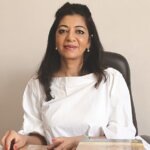“The extensive global market penetration also required our products to be advanced, customized, and highly productive. To this end, the company since 2011 has been in the pursuit of relevant acquisitions. The idea was to acquire one of the competitors abroad to increase our technical know-how with more competitive products in the basket for the demanding global customers,” said Mr. David Dostal, Chairman of the Board, PAPCEL, a.s. in a recent Interview with Paper Mart.
PAPCEL, a supplier of complete paper mills including supporting utilities and infrastructure, made its mark long ago in the European market with its unique machine designs and modern energy-saving solutions, and is now spreading its wings in larger global market through few distinguished acquisitions, making its product offerings vast and cutting-edge. The company successfully acquired market leaders like ABK, GapCon Tissue, and PMT to enhance its market standings.
Paper Mart: Tell us about the journey of PAPCEL so far. What have been the major landmarks of the company?
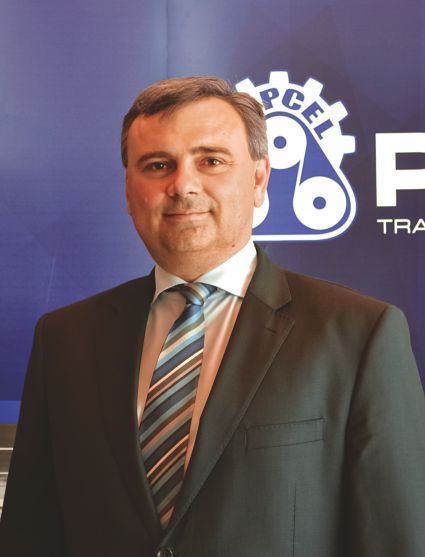
David Dostal: PAPCEL started in 1950 as a service center for the pulp and paper industry. The company kept serving only the local market during first 40 years, during which it invented many products and became capable of supplying complete lines – from pulp section to rewinders. From 1992 onwards, when we acquired PAPCEL, the company started exploring overseas markets with initial focus on Eastern Europe market, where we soon acquired a strong presence including leading market position in the erstwhile Soviet Union countries. Our overseas market expansion has been continuous ever since and PAPCEL has done a significant amount of sales.
It however is not pragmatic to depend on some specific market in the globalized trade scenario as crises may beset one or more regions at a time. Uniform and broad based global market reach is the only solution and PAPCEL has been in continuous quest for such extensive global market by not restricting itself to just the East European markets. The extensive global market penetration also required our products to be advanced, customized, and highly productive. To this end, the company since 2011 has been in the pursuit of relevant acquisitions. The idea was to acquire one of the competitors abroad to increase our technical know-how with more competitive products in the basket for the demanding global customers, and in 2014, we acquired ABK and started serving their customers. After this acquisition, we got a chance to supply to China and started producing tissue machines by gaining on ABK’s experience and knowledge on the Eastern European markets.
After the acquisition of ABK, we were able to design bigger and faster machines. However, the infrastructure in the Litovel plant was limited. The dice of the machine was around 4m. We searched for the possibility of improving our infrastructure in order to produce bigger machines. We then acquired the service center of Italy’s Burgo Group with extremely modern machinery, and we were able to produce parts of complete paper machines of 5m deckle size. This service center is very well equipped. We have a line up to 18m long and 2m diameter along with grinding machines and vertical lines up to 6m diameter. We can produce yankee dryers, the biggest in size, and what the market requires today. Whatever the market needs today, we can provide for sure.
In 2016, we acquired a part of GapCon, i.e. GapCon tissue. This is a sales-engineering company located in Verona and is mainly specialized in tissue with great innovative potential. The skilled and qualified people within GapCon tissue are very well-known in the Indian market and provide high-quality service to the customer. This acquisition was followed by another acquisition in 2017 of an Italian company PMT, which increased our technical knowledge manifold along with improving designs for the key components of the paper machine.
Through these acquisitions, we have amply enlarged our product portfolio and have become a large group of about 500 people. Of course, the target is to grow further.
PM: Can we see any further acquisitions, or investments in China or India?
DD: There are no plans for any acquisitions right now. Presently, we want to focus on our acquisitions in 2016 and 2017. We would like keep the consolidation of acquisitions, products, and markets as priority by keeping other things on hold awhile. Of course, there are some interesting projects and but we have decided to put them in waiting for the present moment as acquiring and absorbing so many new companies with varying cultures and market strategies are not easy tasks. Besides, the business is capital demanding and finance needs to run the business is enormous. So, we have decided to focus on not spreading too much. After the acquisitions, it is time to integrate the best practices and utilize the resources the best we have now along with eliminating the redundancies. We need to optimize the capacities, set the processes, and serve the markets.
PM: You have now a comprehensive range of product portfolio for the paper industry. Kindly elaborate on the same.
DD: We generally offer complete line including the services for the pulp and paper mills. We also have the ability to operate a paper mill. Today, we are not limited to the existing or conventional sizes of equipment of a paper machine. In stock preparation area, we are now planning to design new sizes of the equipment as we are considering the design of bigger projects. There are ongoing developments in the stock preparation area mainly to be able to design the lines with the capacities over 1000 tonnes per day.
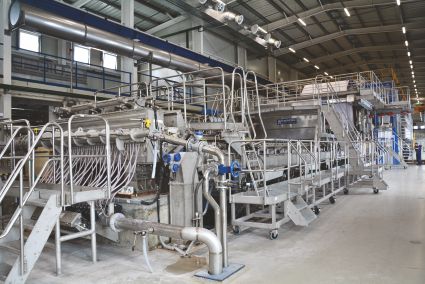
We have enlarged our production program for the tissue by acquiring GapCon tissue and have renamed the company as ICONé. ICONé is very innovative with new patented tissue machines, which give the customer chance to reduce a significant amount of operating costs. At the same time, the concept allows the existing paper mills to increase the capacities in a very efficient way with minimum capital need.
PM: PAPCEL is probably the only company which has a gamut of offerings – everything starting from financing resources or support to the clients to the turnkey execution of the project. Throw some light on the idea behind and how this adds value to the client.
DD: We have several customers. Some customers prefer to handle the projects alone with large investments and often manage projects by themselves with the help of selected suppliers. But there are also a group of customers with limited experience in investments, doing a project once in 5-10 years or once in a life. In this case, we help them with complete solution for the project. Very often, such customers do not have enough qualified staff to execute the project on time or within a certain budget. For these customers, we prepare a package, offering them the complete solution. I won’t say it is always the best solution, but we at least can take the responsibility for complete machine or technological side of the project. Also, we execute the projects for the big consultancies or engineering companies in Western Europe and the United States as they usually only focus on the operations.
PM: Would you like to share the recent technological developments done by the PAPCEL Group?
DD: The developments are going continuously, but the focus currently remains on the stock preparation area with objectives such as cost and energy reduction with suitable product modifications. Besides, we have improved the design of stock preparation line keeping in view the markets where waste paper is very poor with considerable impurities. We focus mainly on energy reduction and process optimization to reduce the rejects or loss of the fiber. Fiber being the precious resource for papermaking, it is better to add few KW of energy and save 1-2 percent of fiber. Moreover, since we are now dealing with customers with bigger machines and higher outputs, we need to adjust the size of the stock preparation equipment accordingly.
In the tissue segment, I think we have the best design of the tissue machine on board. We just completed the invention of a new concept – EconSOFTTM ERS. This concept was presented at last IPPTA conference. After the development of the machine, we have supplied the first prototype to the market and are in the process of evaluating the results. We can now convince customers with theoretical calculations strongly supported by practical outcomes. The first machine is running at Samseng Papelera in Argentina. This innovation will surely fulfill our expectations.
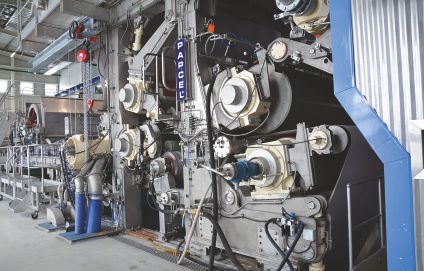
In the paper machine segment, we have all the necessary designs available. The important target is to unify the products inside the group first because we have several designs of the head- boxes, shoe presses, and so on. Integrating the product basket therefore becomes essential in order to provide a convenient picture of our offerings to customers. I think we now have the complete solution to become the leader in many fields of the market, and the recent acquisitions have helped us immensely in that regard. You will hear more about the new products, applications, and inventions in the future.
PM: How do you help your customers in improving the process efficiency?
DD: In the modernization of processes, all investments or actions are usually intended to improve the existing situation with the best overall outcome. Either the customer is coming to us asking for solutions to increase the capacity and reduce the cost, or we visit them to propose such a solution. We have the tools and products which can give the customer knowledge and chance to reduce the costs.
If there is a customer having limited resources and there is a potential to improve his paper machines, we have a possibility to offer him such kind of system where he can pay us either by savings on various fronts or by more added value. That means the customer is paying 30-50 percent of the down payment and the rest would be paid only from the savings he is to make after the improvement. Besides, the customer can also do other projects from the savings he has made. We understand that the money is always limited and the capital always remains a challenge. And, in India, the capital is very expensive, a handicap for the industries like pulp and paper.
PM: We would like to know about your presence in the Indian market along with the strategy that PAPCEL may have chalked out to grow the business in India.
DD: We have brought new and better products to the Indian market, and within the group, there is a more experienced team to work for India. We have increased our capacity and have made our sales team stronger. We have organized an efficient designer’s team along with electric and instrumentation people. We can offer the customers good service. We have people here in India responsible for local outsourcing, which allows us to reduce the cost and improve the service.
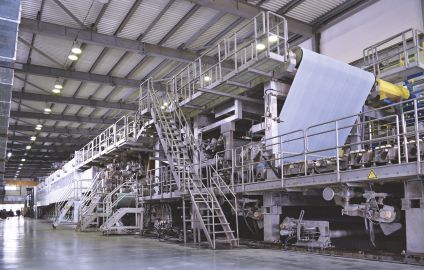
Of course, we have plans to make a setup here in India and make some associations and acquisitions. But, since we gave the priority to acquisitions in Europe, our projects here in India got postponed. This however doesn’t mean that we have given up on growing in India. It is just a temporary matter. We have planned to combine our technology with the local suppliers and have signed some cooperation agreements with certain suppliers.
On the Nepa project, which we have been executing, 80 percent of the supply is done. We have split the contract between the imported items and the local items. We have done some outsourcing and have completed the 80 percent of the job already. Tentatively speaking, two years from now, you can see a workshop here in India.
PM: What kind of orders have you executed in the Indian market and tell us about those in the pipeline?
DD: There were independent approaches by different companies of the Group. PMT at a time supplied the customers like NR Agarwal, Khanna Papers and so on. Our supply is mainly concentrated on the headboxes, formers, rebuilds of the press section, etc. We have just recently completed the modification of a paper machine through ICONé, by optimizing the dryer section to increase the capacity. We are also in the process of supplying headboxes to NR Agarwal. We have already supplied headbox to Pragati Paper Industries Limited. PAPCEL is doing a project with Nepa, which is unfortunately on hold temporarily. A big part of the project has been completed, but some work still remains. Now, the ball is more on the customer’s and the government’s side.
Now when we have strengthened the team and broadened the product basket through some notable acquisitions, the customers’ trust in us grown manifold and their feedback have put more confidence in us. During my trip, I had several discussions with the paper mills to know that they are serious for us and are willing to try our complete paper mill solutions in different grades like writing-printing and kraft liner. We are confident of getting orders worth several million Euros this year.
I am positive about the Indian market and its potential. PAPCEL can find the best solutions for the local mills based on their requirements at reasonable prices with good local service, cooperation with the local companies, and innovative products.
PM: Is there anything that you would like to add?
DD: Primarily, the agenda for India was to build the technical service team to be closer to the customers. The team has been set now, and we are now building a team for the global requirement. With these things ready, we are now set to serve our Indian customers the best we can.



